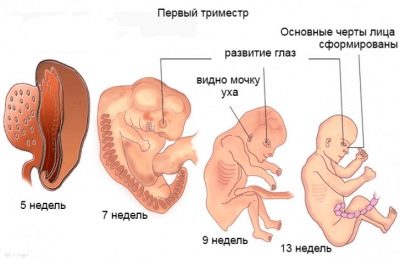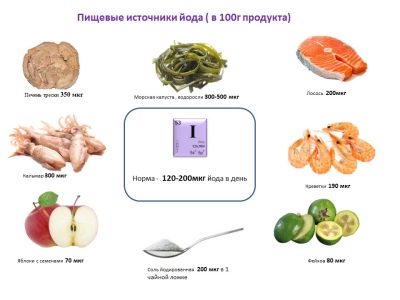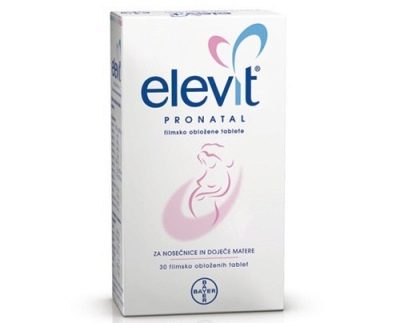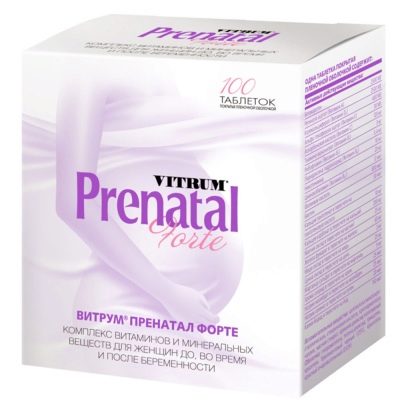Vitamins for pregnant women in 1 trimester
Pregnant women are in dire need of vitamins. After all, the baby takes everything he needs for growth and development from the mother's body. There are vitamins, the lack or excess of which can harm the child himself. And because the question of the choice of vitamins is for future mothers acute.
Good or bad?
Much has been written and said about the benefits of vitamins for future mothers. It is clear that our far ancestors did not have vitamins in capsules, and this did not prevent them from giving birth to normal children. But today, other environmental conditions, women eat foods that are not related to natural, even the milk in the store can be powdered, and cheese - a cheese product. In such a situation, it is only natural that with food a woman will not be able to gain the right amount of vitamins and minerals for carrying pregnancy. Need additional substances.
The initial state of health of all is different, the social and living conditions of women are different, and therefore the need for vitamins should be determined individually. In other words, a box of vitamins is not worth buying just like that, based on reviews from the Internet. Proper selection of a vitamin preparation involves a medical consultation, and only after the doctor has the results of the patient's biochemical blood test.
This analysis shows the content of certain vitamins and minerals in the blood of a particular woman, which will allow the doctor to understand which vitamins are enough for her and which ones should be added. This avoids hypervitaminosis, because an excess of calcium is dangerous for the future mother's kidneys, and an excess of vitamin A during embryogenesis may well cause the development of defects.
Women preparing for maternity who suffer from epilepsy or otherwise take anticonvulsants, be sure to recommend drugs rich in amino acids. Ladies who, on duty or due to life circumstances, are in contact with harmful chemical compounds and substances, including mercury and lead, are prescribed overtime doses of vitamins C and E.
Almost always there is a need to take multivitamin preparations for future mothers who are carrying twins or triplets, women with HIV infection. If a woman drinks or smokes before the onset of pregnancy (and during a special situation), she is recommended to take additional doses of B vitamins. Women with high blood pressure in the first trimester are prescribed additional calcium supplements, and for vegetarians if common sense has not prevailed for recommendations to eat fully, prescribe large doses of vitamins of group B, iron and calcium.
Uncontrolled intake of vitamins, primarily fat-soluble, is quite dangerous. Vitamin A, as already mentioned, can cause abnormalities in the development of the child. Selenium, if it is too much, does the same. Too much zinc consumed by a future mother can lead to a weakening of the immune system, and the excess of fluoride can lead to darkening of the tooth enamel and the formation of ugly stains.
To avoid negative consequences, it is better to discuss the choice of vitamins in advance with your doctor.
Getting pregnant - what substances are needed?
If the doctor does not mind that you take vitamins, you should more carefully assess the composition of a drug. There are substances the need for which in the first third of the term of carrying a baby is the highest. To understand why, you need to be well aware of what exactly happens to a woman and her child in the first trimester. It is during this period that the entire period of organogenesis passes, when all the internal organs and systems are formed from germinal lobes without exception. Any negative factors can lead to pathologies, abnormal development of the baby.
But the amount of vitamins consumed by the future mother should be limited by the daily requirement, which has increased in comparison with the non-pregnant state (for example, calcium is needed one and a half times more, and zinc - by 30%). To better understand the composition indicated on the packaging of multivitamins, let's consider the effect and recommended dosages of basic substances.
Vitamin B6 - participates in the synthesis of amino acids that underlie proteins. Proteins are the main building material for an actively forming children's organism. For mom, there will also be a benefit, because pyridoxine regulates nervous processes and reduces irritability and aggressiveness. Due to the lack of such a substance, women often develop early toxicosisInsomnia is observed. Compliance with the daily norm will help the fetal brain and nervous system to develop as properly as possible. The rate per day is 2.5 mg.
- Folic acid - takes an active part in the formation of fetal tissue, it is necessary for the formation of its neural tube, from which the brain and spinal cord later develop. Vitamin B9 is also needed for the mother - it promotes a more rapid cellular metabolism and mutual substitution, which, with an increased metabolism at the beginning of the gestation period, is very important. The substance is involved in the growth of placental tissue. Chronic need for folic acid is often the cause of spontaneous abortion, gross anomalies of the neural tube (anencephaly - the absence of the brain, cleft of the spinal canal, etc.). The optimal dose per day is 0.8-1 mg per day.
- Vitamin E - important for the metabolism of both the mother and the fetus. It protects both children and maternal organisms from toxins, being an antioxidant. If the baby is born prematurely, a normal amount of vitamin E will reduce the likelihood of blindness and hemolytic anemia. Tocopherol is needed for the formation and functioning of the fetal heart, but its excess can lead to heart defects. Therefore, it is important to adhere to the dosage - no more than 10-13 IU.
If a woman will take 15 IU in the first and second month of pregnancyas recommended by some experts, the probability of abnormalities in the work and structure of the fetal heart is 9 times higher (confirmed by research).
Calcium - participates in blood formation and formation of bone tissue. It is believed that this element is needed mainly in the second and third trimester. For the growth and mineralization of bones - yes. But in the first trimester, calcium is actively involved in the formation of the nervous system, heart and muscles. Daily need - 1000-1200 mg.
- Iron - binding to hemoglobin, it ensures the saturation of organs and tissues with oxygen. With anemia of oxygen is not enough for both mother and child. Every day in the first trimester, a woman needs 30-60 mg.
- Iodine - participates in the production of hormones. Already in the first trimester, the child begins to produce its own hormones, then the need for zinc increases. Important for the formation and development of the nervous system of the baby.In the earliest terms helps prevent anomalies and malformations, the formation of cretinism and other forms of mental abnormalities. Daily need - 200 mcg.
- Zinc - participates in the growth of the fetus. The amount of zinc in the body of a pregnant woman depends on the weight with which the baby is born. Also, zinc is needed in order to give birth to go more gently, not delayed. Daily rate of 15-20 mg.
Other vitamins: vitamin D - 400 IU per day, vitamin K - 1 mg per day, vitamin A (retinol) - not more than 3000 IU per day, vitamin C - 60 mg per day.
It is desirable that the expectant mother in the first trimester receive all of the above substances.
Which is better to take: a review of popular drugs
Only a doctor can answer this question precisely; we have compiled a list of the most popular drugs among Russian women. After a brief introduction, a woman can discuss with her doctor.
"Elevit Pronatal"
The drug is fully balanced, advanced, vitamin and mineral components are presented in the right amount taking into account pregnancy daily amount. Advantages - the mass, but there are drawbacks. So, there is no iodine in the composition, therefore it is desirable to take it separately, the drug “Iodomarin” will be suitable. It is believed that the complex reduces the manifestations of toxemia.
Vitrum prenatal
According to the mineral composition, the complex has no analogues, but the amount of vitamins leaves much to be desired. According to the reviews of women, the pills often cause allergic reactions, although many positive reviews.
Alphabet Mama
Inexpensive, but rather specific drug that is not always convenient to use. The composition does not cause serious criticism. But the dosage of each pill does not contain the daily need for vitamins and minerals, it is necessary to take pills 4 times a day, which is not always convenient - the expectant mother is busy, she can forget.
"Materna"
It is not suitable for everyone, but mainly for those who lack iodine and B vitamins. In the complex, this sector of substances is higher. According to reviews, often causes indigestion, rashes and other forms of allergies.
"Complivit Mom"
Inexpensive complex, balanced, but the content of vitamin D, E is lower than in similar complexes. If the first trimester falls in the summer or spring, you can get by with what you have, but in winter and autumn it is better to opt for another drug or add vitamin D to it separately.
"Pregnavit"
Very affordable drug that does not require significant costs. But the composition leaves much to be desired. It contains few minerals and iodine. If you decide to take it, it is necessary to take separately preparations of iodine, calcium and iron.
Femibion NATALCARE
Fembion NATALCARE - Austrian drug of the average price category. Manufacturers replaced folic acid with metafolin, a compound that is better absorbed. The drug has not yet received widespread and fame in Russia, but is already gaining popularity, since no allergic reactions or other side effects have been identified.
How to take (tips and tricks)
Reception of vitamins in the first trimester of pregnancy requires a careful attitude from the woman. Just like that (when and how it is necessary) vitamins do not drink. At best, they will not benefit, and at worst they will also do harm. There are doctors - supporters of the separate intake of vitamins, and they are right in many respects, because multivitamin complexes do not take into account some important points.
- Calcium and iron together compete for absorption. If they enter the body at the same time, calcium will win, because it will reduce the absorption of iron by almost 2 times. Therefore, it is desirable to take them separately or choose a drug where the iron content will be greater than the calcium content.
- Ascorbic acid (vitamin C) and cyanocobalamin interact poorly. Under the action of ascorbate, vitamin B12 is oxidized by almost a third of its content. Compounds are obtained, not the most beneficial for the future mother's body.
- Magnesium prevents iron, and zinc - chromium. Calcium is not absorbed without vitamin D3, and in order for the body to absorb vitamin B12 well, calcium is needed.
Allergy most often develops when taking medications, where doses of vitamins B1 and B12 are simultaneously increased. Vitamin complexes for women "in an interesting position" have a cumulative effect. If the pregnancy is planned, you should start taking them in advance, a couple of months before conception. Then, by the time the fetal organs and systems begin to form, the future mom will have enough folic acid and iodine in the body.
Vitamins do not take on an empty stomach, it is best to drink them with meals. Immediately two multivitamin means - this is an obvious search. Do not drink vitamins milk, strong tea. It is best to drink regular drinking water at room temperature. If there is a rash, itching, unpleasant symptoms of the gastrointestinal tract, taking vitamins should be canceled and consult a doctor for the appointment of another drug.
Important! If a woman takes a multivitamin in the first trimester of pregnancy, this does not at all relieve her of the need to make the right diet and eat vegetables, fruits, dairy products, and greens.
I especially want to say about meat and fish. These products are a source of protein, which the child now needs to form organs.
Recommendations of the doctor for taking vitamins to a woman in the first trimester of pregnancy, see the following video.

























